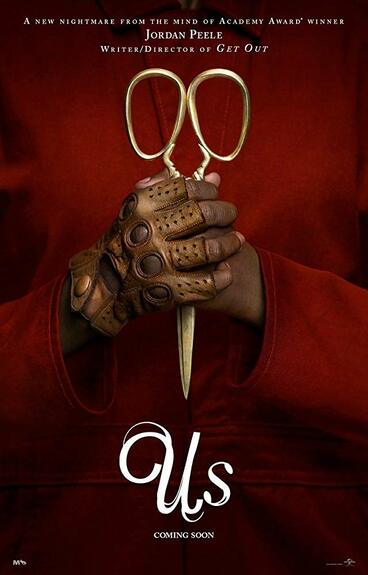Written by Zeke Perez Jr.  I’ve flirted with the horror film genre throughout my life, behind halfway closed eyes and tensely crossed arms. For quite some time, I was the type of person who would lunge for the remote and change the channel whenever the trailer for a scary movie came on. That being said, I have (somehow) seen quite a few horror movies over the years, and even plenty I loved, though very few of those instances were in theaters, where the silence is audible, and the scares are amplified. Then Jordan Peele’s Get Out came along and I found myself unable to fight the urge to see it on the big screen. Peele drew me back yet again with his newest release, Us. Us continues Jordan Peele’s pivot into horror and firmly establishes him as one of the genre’s greatest minds of this era. Peele builds on the history of horror while paying homage to it. The film plays off a number of well-established horror tropes: an ordinary family alone in a secluded house; a home invasion; a cat-and-mouse game between good and evil; doppelgangers. But it also ventures beyond that contained format and challenges us to think about ourselves as a society more broadly, highlighting the ‘us vs. them’ mentality and pitting the haves against the have-nots. It’s a deliciously slow-burner that unfolds from within itself as the movie goes on and only gets more fun and thought-provoking the longer you dwell on it. The cast is without a doubt the highlight of this movie. The entire ensemble deserves praise for their ability to portray both their characters and the unsettling ‘shadow’ or Tethered versions of their characters, existing as both the frightening and the frightened. Shahadi Wright Joseph, Evan Alex, and Madison Curry - the kids in the film - all do a stellar job. Winston Duke and Tim Heidecker inject the tone with levity. Elisabeth Moss steals a few scenes without saying a word. Oscar winner Lupita Nyong’o steals the show. Her masterful use of a wide range of facial expressions and emotions gives her characters, and the story, boundless depth. Nyong’o delivers a monologue that can almost be labeled as a ghost story, registering as one of the most bone-chilling moments of the movie. The film also excels in its cinematography and choreography. Tension is heightened through several excruciatingly slow pans and zooms. You share in the characters’ terror thanks to lots of creepy tightly-framed closeups. Shots involving mirrors and glass tables make creative use of reflections to add to the movie’s overarching theme of duality. That theme is played upon beautifully with action late in the movie, where characters mimic each other through dance and fight scenes.  Composer Michael Abels strikes gold again with a score that adds considerable value to the movie, as was the case with his inventive score for Get Out. Abels has the ability to take the most commonplace or unimposing songs and make them horrifying. One of the major hooks of the Us trailer was Abels’ remix of the hip-hop classic ‘I Got 5 On It’ by Luniz. The song reappears throughout the movie in some key scenes and sticks with you long after you’ve left the theater. Get Out’s opening credits rolled with ‘Sikiliza Kwa Wahenga’, an Abels original that is almost exclusively in Swahili and provides quite a bit of foreshadowing and insight when translated. Similarly, Us features a melodic and twisted rearrangement of the ‘do-re-mi’ solfége. (Not coincidentally, Abels said in a 2017 interview with ‘Film Music Magazine’ that The Sound of Music was the first movie he saw, and that ‘Do Re Mi influenced (him) profoundly’.) Thanks to Abels’ Hitchcock-esque score, Us is a horror movie that sounds as good as it looks. One mistake I made was actively comparing this movie to Get Out while watching. Where the humor in Get Out is more satirical, the laughs in Us serve to break the tension in big moments (something I was mixed parts grateful for and disappointed by). The former’s social commentary is more pointed and obvious, while in the latter it is subtle and lingering, though it is ever-present and clever in both. Each gives you a lot to think about but Get Out ties its loose ends together a little more neatly, while Us delivers intentional ambiguity. I initially found myself faulting Us for these differences, but Peele’s newest effort is likely more ambitious and deserves to be thought of in its own space. I do have to admit that there was a stretch of the movie that had me doubting Peele. I questioned where the movie was headed and began to grow frustrated that it hadn’t started to tie things up and draw any larger conclusions. Yet while I thought I was two steps ahead, Jordan Peele had taken three. Although it follows along with the standard horror formula in some ways, Us does a solid job of subverting audience expectations. It yo-yos wonderfully between being a very contained home invasion slasher and something much more broad. Us left me feeling unsettled exiting the theater. It was the first thing on my mind when I woke up the next morning and I’ve spent the last few days continuing to think about it. While some unanswered questions and potential holes do exist, particularly around the origins and mythos of the Tethered, Us gives you room to think about those things for yourself. I’ve enjoyed digging into all the fan theories and researching Easter eggs, including the meaning behind the movie’s recurring bible verse. It’s the type of movie that blossoms just as much in the time you spend processing it as it does on screen. Us is a thrilling, layered horror film; one that you’ll want to see in theaters and one that warrants a second viewing.
0 Comments
Leave a Reply. |
Archives
April 2025
|
|
© 2012-2025, Nerds That Geek LLC.
All Rights Reserved. |
uWeb Hosting by FatCow

 RSS Feed
RSS Feed
